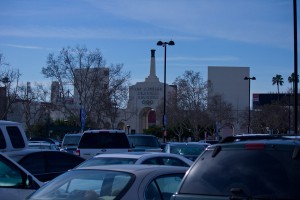Legislators lobby for parks, not parking lots, in Stadium
The California Legislative Black Caucus expressed strong opposition to giving USC control of the Coliseum’s parking lot, part of a deal that would allow USC to control the Coliseum and surrounding areas.

Turf wars · The most recent proposed lease agreement for control of the Coliseum could result in continued access to parking lots for football fans, but no additional parks for the surrounding community. – Joseph Chen | Daily Trojan
The caucus wrote in a letter last week that the parking lots near the arena should be converted into parks for the South Los Angeles neighborhood.
The proposed agreement between the state of California, which owns the Coliseum, and USC would allow the university to lease the Coliseum, the Sports Arena and parking lots one through six in Exposition Park. The Coliseum Commission currently manages the stadium complex for the state.
As determined in meetings last year, the proposed agreements would allow USC to enter into consecutive 20-year leases for the next century. It would also give USC the option to demolish the Sports Arena and build a professional soccer stadium in its place.
Vice President of Real Estate Development and Asset Management Kristina Raspe said the university is considering this new lease of the facilities because the Coliseum Commission is in breach of the lease it entered into with USC in 2008 after the commission failed to make needed repairs and improvements to the Coliseum.
“We believe that the Coliseum is a local and national treasure that should be improved and preserved for many generations to come, and the Coliseum Commission does not have the financial ability to preserve it any longer,” Raspe said. “USC is willing to invest its capital to improve and maintain the Coliseum so long as it is given the ability to manage, operate and preserve the venue on a daily basis, again at USC’s expense.”
Raspe believes USC will only have this ability to operate if the venue is surrounded by ample parking space.
Though critics say that the proposal would allow USC too much power over the taxpayer-owned parking lots, USC officials argue that this space is crucial to the preservation of the Coliseum.
“Available and affordable parking is essential to the financial viability of both the Coliseum and the Sports Arena,” Raspe said. “If USC is to invest a minimum of $70 million into the Coliseum, it must be assured that the venue is given every ability to compete with other local venues.”
Assemblyman Reggie Jones-Sawyer, a caucus member whose district includes the Coliseum, thinks differently. The former Los Angeles City Hall real estate expert said that the deal violates a promise made by the state to eventually transform the lots into parks for the South Los Angeles community.
“When the entire Legislative Black Caucus looks at the parking lots, we see green space,” Jones-Sawyer told the Los Angeles Times. “We see families. We see picnics. We see soccer fields.”
The CLBC could not be reached for comment.
Some students think USC should be more actively involved in running the facility, which hosts the football team’s home games.
“The Coliseum is a huge part of what defines USC, our football program and our incredible school spirit,” said Mandy Raeder, a sophomore majoring in accounting. “The stadium is a historic part of USC culture, and we should be in charge of maintaining it in order to preserve those traditions. I think the parking lots are crucial to that, because it allows for more fans and alumni to come see the games.”
The parking lot proposal was developed by USC and Anna Caballero, a member of Gov. Jerry Brown’s cabinet. The deal stipulates that USC would pay the state rent for the Coliseum and parking lots and also provide tens of millions of dollars in funding for improvements to the facility.
The California Science Center board, which has the final authority on what will happen in Exposition Park, must approve any agreement before finalizations are made.

There are 2 choices here – give USC what they want or demolish the Coliseum. Parks are great but they don’t help pay the bills. USC is the only entity ready, willing and able to revitalize the stadium but they aren’t going to do it with one hand tied behind their backs.